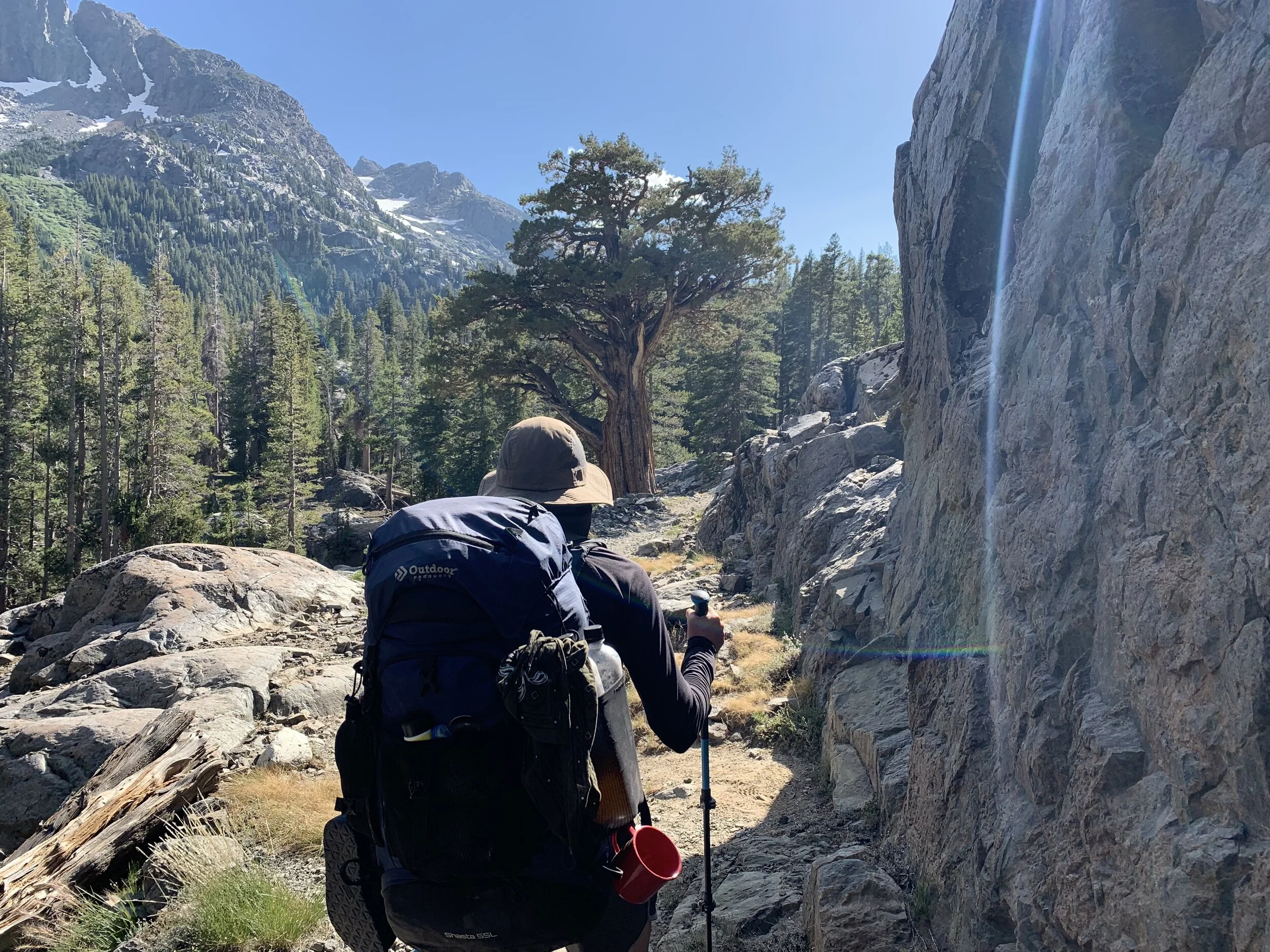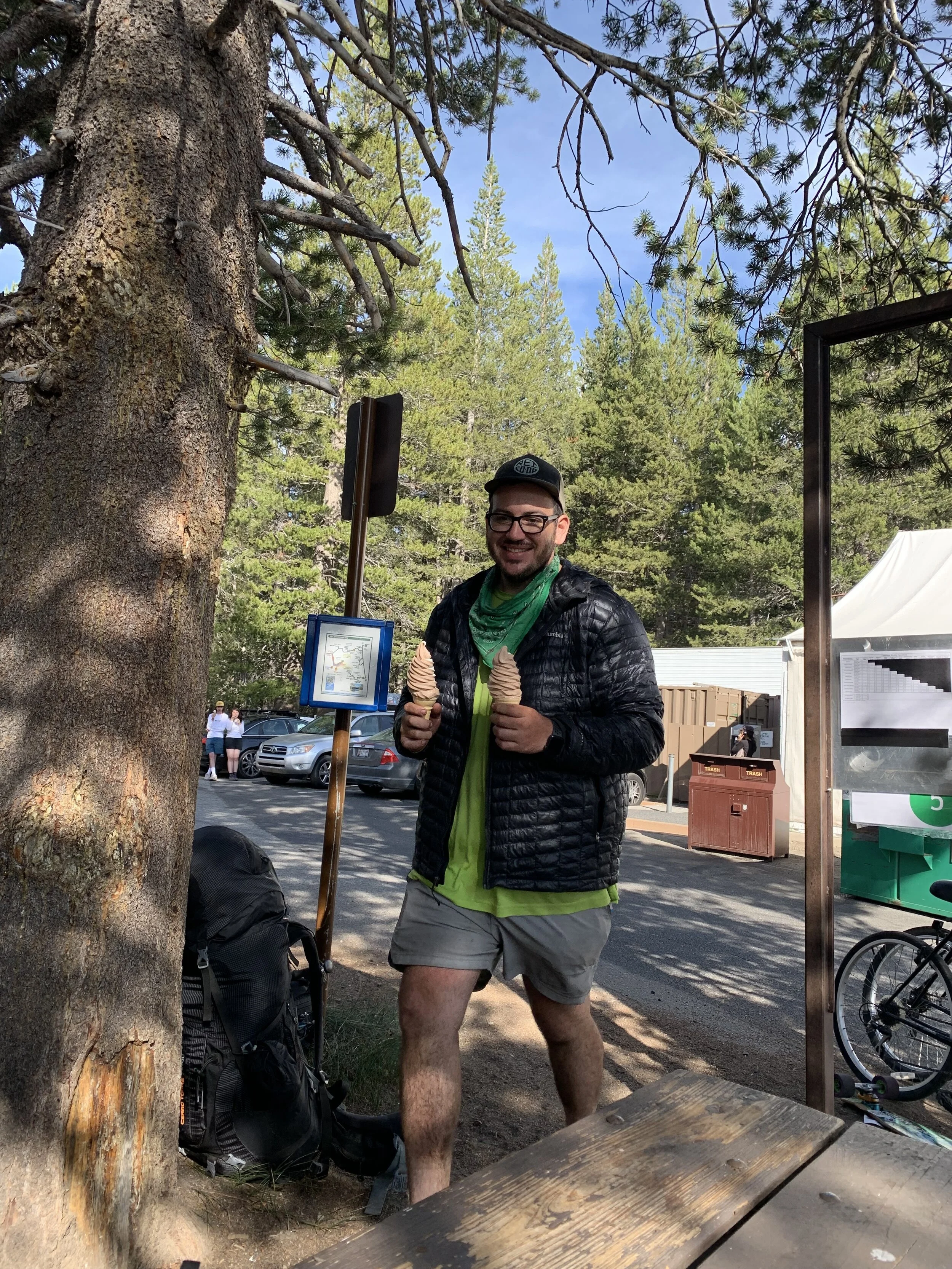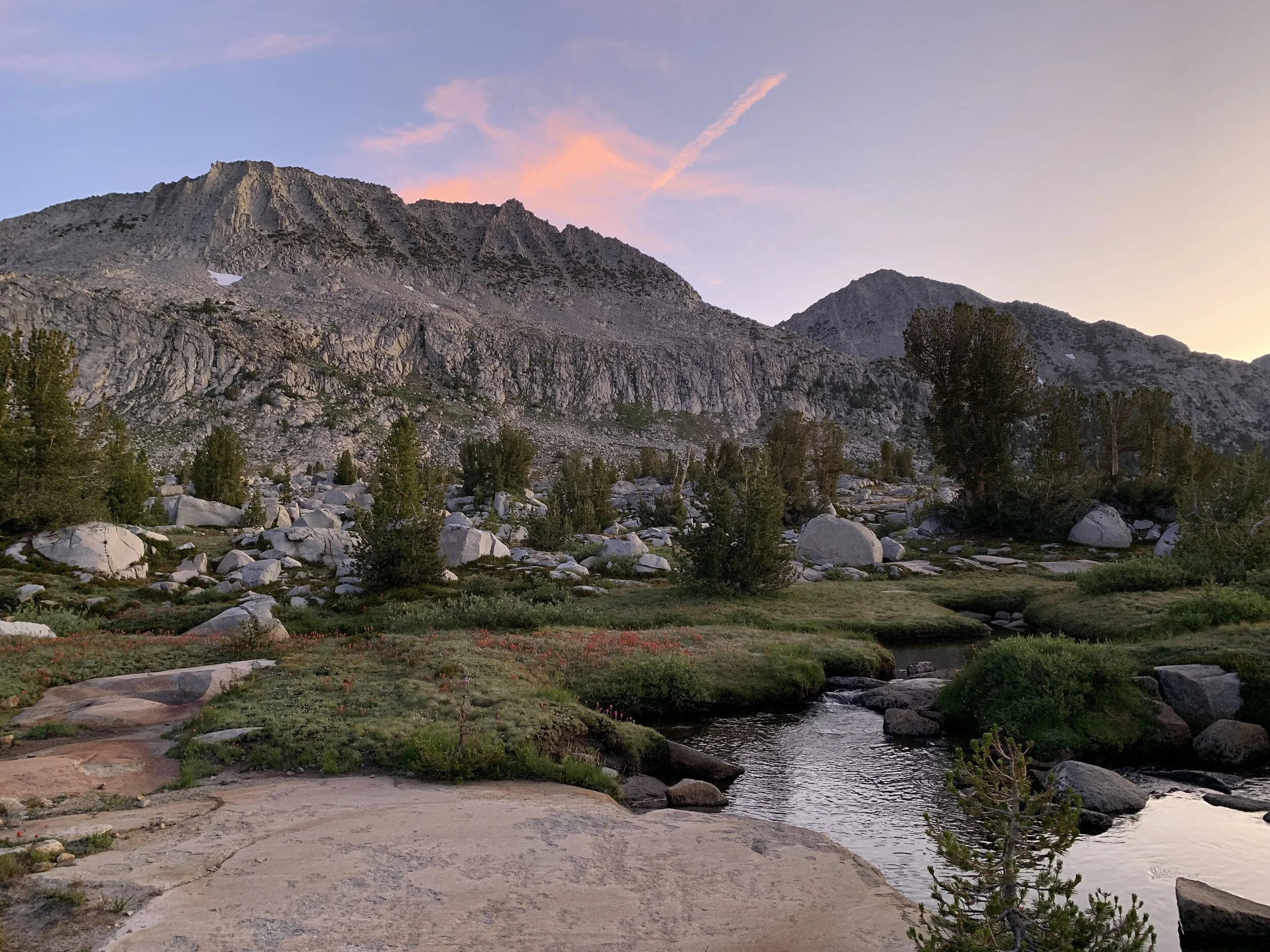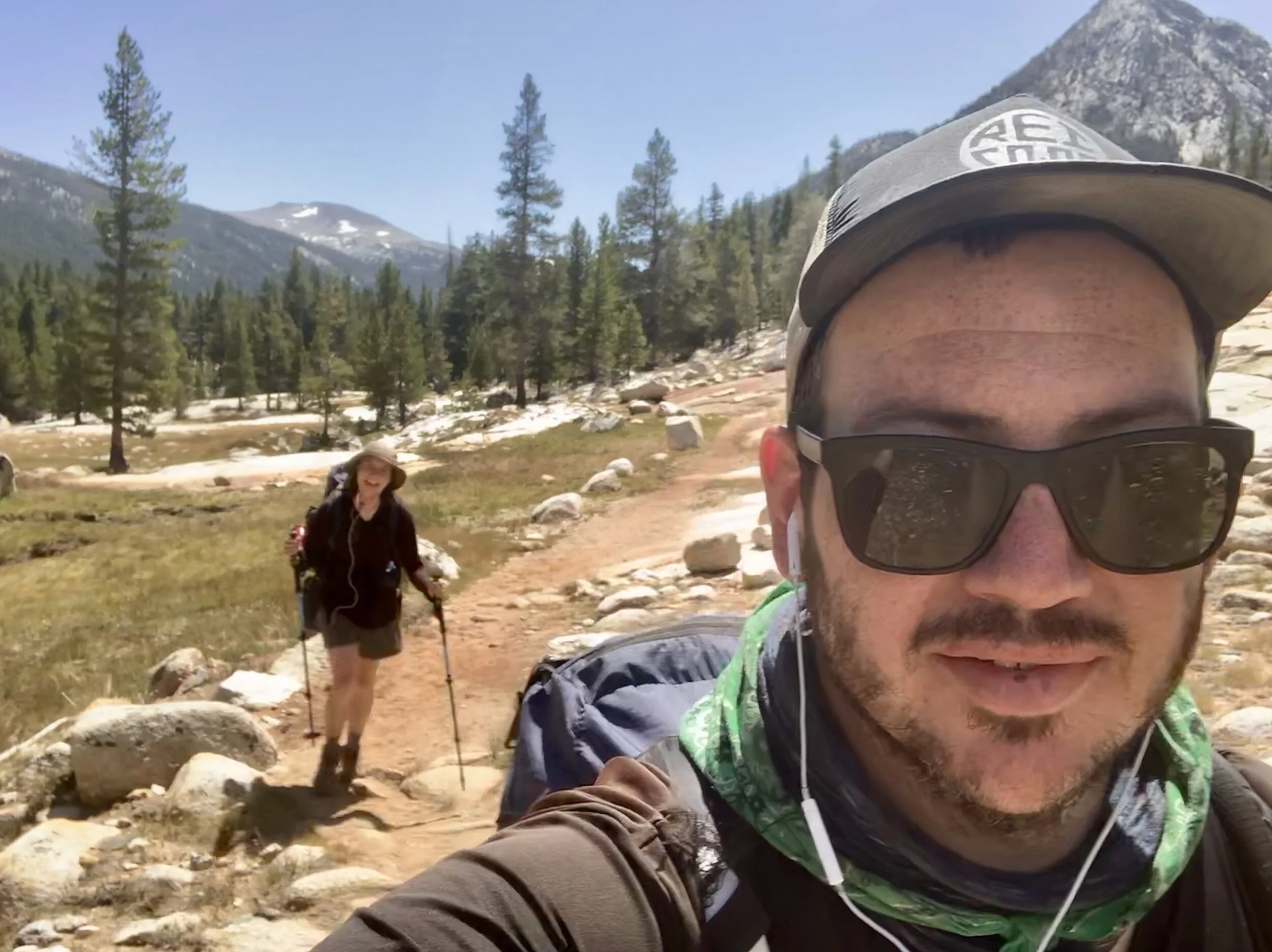
09: Rewrite
Andrew and Rocky find themselves days away from finishing a month-long, 200-mile hike.
Trail Weight is produced and written by Andrew Steven. Our Story Producer is Monte Montepare. Executive produced by Jeff Umbro and The Podglomerate.
Transcript
Note: Transcripts have been generated with automated software and may contain errors.
Andrew: When I started this podcast, I thought it would be about weight loss. Then my mom died, and I thought hiking and physical fitness could be a metaphor for grief. Along the way, I learned I was in a story of repeating loss—a loss of ignorance, expectation, reality… Slowly, the questions I had overtook the lessons I thought I had learned.
I now found myself days away from finishing a month-long, 200-mile hike and days away from completing a podcast that’s taken over two years to make: unsure of what the final steps would look like and uncertain of how to write the ending.
Andrew: We're three days away from finishing the trail.
Rocky: Yes.
Andrew: What have you learned?
Rocky: Oh, what have I learned? I wasn't expecting that. Um, I have learned that I could push through sayings that are very hard or scary or things I don't want to do. So-- cause sometimes I just want to sit. Sometimes I just want to not have to do the same routine every single day. But, um, yeah-- It's just like one foot in front of the other. You can walk-- how many miles? 250 miles. Is that right? 210?
Andrew: Uh, yeah. The JMT is 210, plus-- that's trail miles. Not counting, like, walking around, setting up tents, nor-- since we started a little bit earlier. Yeah, a little over 200.
Rocky: I guess. That's what I've learned about myself.
[Theme Music]
Andrew: I’m Andrew Steven, and this is “Trail Weight,” a podcast about hiking outdoors and the lessons learned along the way.
Andrew: This is day-- What day is it?
Rocky: It's the 20th.
Andrew: This is our 21st day of hiking. And we are at the, uh, Rush Creek Drainage area just below Donahue Pass, which we'll do tomorrow morning. That's our final pass of the trail. And we just have three days left on this hike. It's uh-- This tent has definitely become a new home and it-- it's a symbol of comfort. And at the end of the day, like it's almost-- we just resupplied in Red's Meadow and had a room there. And it was very nice to have, like, a real bed and everything, but it almost feels more comfortable in this small little tent. Just cause I think it's what we're-- what we've been used to for the past 21 days. So yeah, as we get closer to the finish line, it's um, it's strange. It's a, you know-- This isn't just like a week long trip or even a weekend trip. And uh, it's going to be weird waking up and not having to do 10 to 15 miles.
Andrew: If you’re writing a story, they say a good ending should leave you satisfied. The arc of the story comes to a place of resolution and the main character achieves their goal. This is the part of the life-as-a-story analogy that starts to break down. It’s a great tool for inspiration. I called it a life hack earlier, to help you accomplish whatever you were trying to do. But the metaphor doesn’t work as well as an accurate description of life. If I was writing the story and in complete control, my mom would still be alive.
But we’re not really in control of life, and, then again, some of the things that make something a “good” story are the things that make life hard, that add texture and meaning. Good stories are dangerous and not something you want to tell all the time. Maybe that’s the point of this podcast, so I can tell it once well, and then move on? Choosing where to end a story can change everything.
They say the resolution of the story must wrap up the conflict laid out in the beginning. The ending should feel complete. I can’t say the last 15 months have felt complete. In a year that’s been hard for the entire world, many of us are still reeling from the effects the covid19 pandemic have had on our lives. We’ve lost work, family, and friends. We’ve experienced deep existential trauma. Some of us have even lost sight of it all.
This isn’t the year I would have written.
They say satisfying endings have a bit of surprise. My brother passed away this year. Surprise. I’d gladly take some predictability over this ending.
They say the best way to write a good ending is to know how the story will end before you start. You can’t do that in real life. None of us know what will happen next. Our vision and foresight only give us glimpses of the horizon, hidden between the trees and rocks, obscured but the sun in your eyes and you climb higher for a potential better view.
Andrew: I'm hiking up Donahue Pass, which the ridge line marks the dividing line between Yosemite National Park and the national forest, which I'm in right now. And I've just sort of been reflecting on this whole hike as it's starting to come to an end. And you know, this started out as a weight loss journey and a sort of #YOLO experience after my mom passed away a year ago, but it's really turned into something so much more. Just thinking about what it really means to be outside, be in nature, what effect it has on you, be it restorative and healthy or the isolation and sort of separation from the rest of the world.
Andrew: If I could choose the ending for this story, I’m not sure what I’d choose. It’s hard to end the story. The reason. “They say” all those things earlier, the reason why there are a list of tips to help you end your story, is because it can be hard to finish well.
The fear that the story ends is a lot like the fear of death. When it’s over, it’s over. Did you do all that you could do? Was it worth it? Did you say what you needed or wanted to say? Will it be remembered? Why do I even want it to be remembered? When it’s over, is there more, or is that all there was?
Stephen Cave: Who here remembers when they first realized they were going to die?
Andrew: This is Stephen Cave.
Stephen Cave: At some point, all children become aware of death. It can happen in different ways, of course, and usually comes in stages. Our idea of death develops as we grow older. And if you reach back into the dark corners of your memory, you might remember something like what I felt when my grandfather died and when I realized it could happen to me too
Andrew: And this is from a TED Talk he gave 2013.
Stephen Cave: We have to live in the knowledge that the worst thing that can possibly happen one day surely will, the end of all our projects, our hopes, our dreams, of our individual world. We each live in the shadow of a personal apocalypse. And that's frightening. It's terrifying. And so we look for a way out.
Andrew: He is a philosopher and author who looks at how the stories we tell affect our view of death.
Stephen Cave: We develop our worldviews, that is, the stories we tell ourselves about the world and our place in it, in order to help us manage the terror of death.
Andrew: For Stephen Cave, he calls these stories, “Immortality Stories” and they’re the types of stories you’d hear from religion, or even mythology and fantasy tales. A magic pill or potion to cure death and disease, a promise to live on after death, a soul that keeps living after your physical self is gone, or the memory and legacy of a life echoing on throughout eternity.
But for Stephen, he doesn’t believe in any of that.
Stephen Cave: I find it helps to see life as being like a book: Just as a book is bounded by its covers, by beginning and end, so our lives are bounded by birth and death, and even though a book is limited by beginning and end, it can encompass distant landscapes, exotic figures, fantastic adventures. And even though a book is limited by beginning and end, the characters within it know no horizons. They only know the moments that make up their story, even when the book is closed. And so the characters of a book are not afraid of reaching the last page. Long John Silver is not afraid of you finishing your copy of "Treasure Island." And so it should be with us. Imagine the book of your life, its covers, its beginning and end, and your birth and your death. You can only know the moments in between, the moments that make up your life. It makes no sense for you to fear what is outside of those covers, whether before your birth or after your death. And you needn't worry how long the book is, or whether it's a comic strip or an epic. The only thing that matters is that you make it a good story.
Andrew: I relate to a lot of that. I don’t think we should fear the end of the book, but I also think there’s more beyond the pages. I don’t know what it is, if it's a place or a feeling or an energy. If we’re conscious of it or not.
It’s much too easy for me to wonder about life outside the story, beyond the book, over the horizon. Except it’s not a horizon, because you are able to get close to it. There is a finite end, but maybe there’s a another story to be written, a sequel if you will, where the gang get back together, maybe a little older, maybe the group is slightly smaller, and it doesn’t quite feel the same as before, but if you’re able to take it for what it is, its okay, and maybe you can learn something knew that you weren’t expecting.
Andrew: We just hiked over the last high point of the trail. And it is literally now all downhill into Yosemite Valley. We're almost done. I can't believe it.
[Break]
Andrew: We hiked down into Lyell Canyon and were in awe of the quiet beauty. From here we hiked a long, flat trail to Tuolumne Meadows through a lodgepole forest and river lined meadow - a scene reminiscent of Yosemite Valley, minus the cars and crowds and campers.
We were excited to get to Tuolumne Meadows before the store closed so we could have real, non-freeze dried food again.
Rocky: I’m ready. I’m ready. Have you ever ran with a 30 pound backpack? You look like an idiot. But I want a burger. I want a burger.
Andrew: We camped alongside the RVs and crowds, almost as a way to remind us that the end was near and to prepare for re-entry into the population.
Andrew: So we're-- It's early in the morning here at Tuolumne Meadows and we're waiting for the--
Rocky: It’s 7:49 AM. Not that early.
Andrew: For some people.
Rocky: Okay.
Andrew: I’m painting a scene.
Rocky: If you’re an old man, you would already have a cup of coffee--
Andrew: Yeah, but they haven't, they haven't left yet. The old men got up before us, but they didn't--
Rocky: I know, those old men are weird as hell.
Andrew: Eww.
Rocky: I know don't, don't look at my hiking poles.
Andrew: It’s like so, so-- the tops are like chewed up?
Rocky: I don't know. I have sweaty hands. Okay. I'm a nervous person.
Andrew: You have acidic sweat. [Laughs]
Rocky: [Laughs]
Andrew: So we're at Tuolumne Meadows and we're waiting for the grill/restaurant to open up so we can get some breakfast food.
Rocky: yes.
Andrew: And we ate dinner here last night too.
Rocky: Yes.
Andrew: And I want to know, so we had real food at Red’s. We had burgers at Red’s.
Rocky: Yes.
Andrew: And we had burgers here at Tuolumne Meadows.
Rocky: Yes.
Andrew: And which burger is better?
Rocky: Yes. Sorry, I got distracted. There's all these hikers walking by. And I think they're not hikers. They're rock climbers. Cause one guy was wearing a helmet and who wears a helmet?
Andrew: And they have ropes and carabiners and--
Rocky: Yeah. And then I got excited cause I was like, oh my God, what if we saw Alex Honnold?
Andrew: Alex Honnold.
Rocky: Which we probably wont, but that would be cool.
Andrew: How many times do you think he gets, like people just yell “Free Solo” at him as if it's his name.
Rocky: Umm...
Andrew: A lot.
Rocky: Probably a lot.
Andrew: “Free Solo.” “Free Solo, come here Free Solo.” [Fades out]
Tuolumne Meadows Grill.
Andrew: I like how different we sound here than in the first couple of episodes. We’re hyped on food and the pace of the world is slowly coming back. We’re excited to have accomplished so much, and maybe lost some of the meditative aspects of the hike.
Rocky: [Fades in] Anyways. So which— what were we talking about?
Andrew: Which burger is better? The Tuolumne Meadows grill or the Red's Meadow cafe?
Rocky: Oh, so I think Tuolumne Meadows burger was well, more put together better.
Andrew: Like the whole burger.
Rocky: Like the whole burger. But I think the Red's Meadow patty had more flavor.
Andrew: The beef was better.
Rocky: The beef was better and like, tastier. Uh, but it was kind of like a sad little guy. You like, look and open it up and be like, “oh.” Yeah, flavor I think Red's Meadow. I also didn't have bacon on mine. You put bacon. Did that-- was that good?
Andrew: That helped. Yeah, I had a double cheeseburger here at Tuolumne with bacon.
Rocky: Yeah. And I just said, I was like, no bacon.
Andrew: And I just had a cheeseburger at Red’s.
Rocky: Cause sometimes I feel like bacon can ruin a burger. Like-- like people that are obsessed with like bacon wrapped hot dogs. I'm like, why? Just have them separate? They're good on their own. It makes it taste weird.
Andrew: The other benefit here—which they weren't amazing—but they had potato wedges at Tuolumne.
Rocky: Oh, they were so good. They were like seasoned.
Andrew: I mean, they were just, you know, like-- I think that's what it is-- I think here it's much more like fast food. [Fades out]
Andrew: The first time I talked about eating a burger on the podcast was when I shame ate McDonalds. When I started, I thought so much more of this would be about food, but here, it was something that just sort of was.
Rocky: [Fades in] It's just so nice to have like regular food. Oh, I ate so much. So I ate all that. I ate a double cheeseburger. I ate the potato wedges. I had an ice cream cone. I had a Gatorade. And I had two sodas.
Andrew: And half a bag of chips.
Rocky: And half a bag of chips. And I wanted to eat more.
Andrew: Yeah, we were in the tent and you're like, “do I have time to go back to the restaurant?” It was like closing in 10 minutes. Like if you sprint there.
Rocky: But like, it was-- it was weird. Cause I, when I was—
Andrew: And when we say restaurant, it's literally like a canvas tent enclosed building.
Rocky: And it's like a circus in there.
Andrew: It's like, well, a very small circus.
Rocky: Yes. Very tiny elephants.
Andrew: It's like a--
Rocky: Tiny ringmaster. [Laughs]
Andrew: It's like a counter that you order like, we're just on picnic tables outside. [Fades out]
Andrew: I was describing these “restaurants” for the benefit of you, the listener, but also, I think subconsciously I was starting to recategorize and acclimate to what restaurants are, and modern-day society is. I never realized how much I missed tables and chairs.
Andrew: [Fades in] It's not a restaurant.
Rocky: Right. But it is this restaurant.
Andrew: But like-- like Red’s was an actual like diner.
Rocky: Yeah. That's true. Very true. Very true. Very true. Uh, oh yeah. Halfway through my ice cream coat, I was eating it and then all of a sudden I was like, oh, I feel full. I don't feel good. And it was so weird because it's like, I still had an appetite. Like, I still felt hungry.
Andrew: But your stomach was at capacity.
Rocky: But my stomach was like, “no, no food. No, no, no.” Uh, and yeah, that was tough. Cause-- and then like eventually like my stomach acid digested, all of that food in there. And then I was like, oh, I'm so hungry still.
Andrew: I think they’re opening up.
Rocky: Get-- go.
Andrew: We ate our breakfast and hiked through Tuolumne, away from the SUVs and day hikers and into the backcountry for one more night.
Andrew: So it's the last night and we're in Longmeadow, near Sunrise High Sierra Camp. [Fades out]
Andrew: The Sunrise High Sierra Camp was empty this year, but it was one of a few cabins that were built in the backcountry so someone could backpack without having to carry all their own food or lodging. There was something pleasant about the idea of going through what we’d been through without having to carry a heavy load. Somehow being able to experience the highs without the weight. That would be nice.
Andrew: [Fades in] And thinking about food and our family that's supposed to meet us, and--
Rocky: Do you think you’ll get emotional tomorrow? Knowing that its over and--
Andrew: I think so. I definitely will feel emotional whether it's shown or not. I don't know?
Rocky: Yeah, me too.
Andrew: Not that I am trying to hide it. It's just, I don't know. I'm not sure--
Rocky: --if it'll come in. It probably will. I don't know. Actually.
Andrew: I don't know. I think seeing her parents there will make it emotional regardless
Rocky: And just thinking like what we just did.
Andrew: Yeah. I'm proud of it.
Rocky: So proud. I'm proud of you in front of me and proud of us. We did it.
Andrew: We could end the story here. This could be the last episode. There wouldn’t be a scene where we crossed the “official” finish line. You wouldn’t hear the moment we met up with my dad, when even though I knew my mom wouldn’t be there, I still thought she might. If this was the end, it wouldn’t actually be “the end.” And it would live on in its own “immortality story.” If we don’t know for sure how it ends, there’s always a bit of deniability, and we can happily-ever-after it however we want.
This trip is forever intertwined with the loss of my mom. Ending the trail—finishing the story— meant I couldn’t avoid what came next. This trip would always be finite. It was the plan from the beginning. Whether I wanted to admit it or not.
[Teaser]
[Credits]



